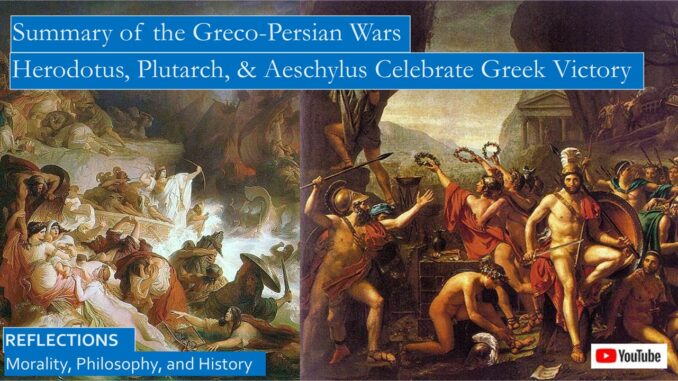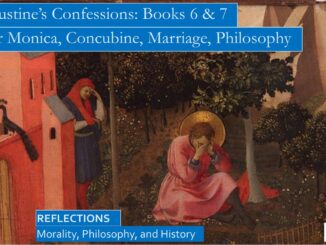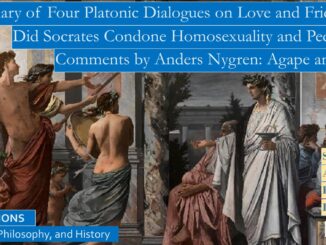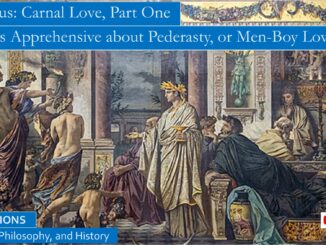
Today we will learn and reflect on the history of the Greco-Persian Wars, summarizing our prior long-form videos. We will ponder many questions:
How were the small Greek city-states, led by Sparta and Athens, able to defeat the massive, mighty Persian Empire?
What led the Persians to challenge the Greeks on their home turf? What was the history of the Persian Empire?
Was the Greek historian of these wars, Herodotus, the father of history, or was he the father of lies?
How did Herodotus’ Histories reflect the warrior culture of the Iliad?
How did the Greco-Persian Wars lead the Greeks into their brutal Peloponnesian Wars between the Athenian empire and the Spartan allies?
Powerpoint Script with Book Links:
https://www.slideshare.net/BruceStrom1/summary-of-grecopersian-wars-herodotus-plutarch-and-aeschylus-celebrate-greek-victory
YouTube video for this blog: https://youtu.be/frBzSQVala4
SUMMARY OF THE GRECO-PERSIAN WARS
What can we learn by reflecting on the Greco-Persian Wars? We can learn more about Greece, and we can learn more about Persia, and how these two fighting cousins influenced each other.
If you look on the map, Greece is on the west coast of the Aegean Sea, Persia is on the east coast. The Greeks were a sea-faring people, and often Greek citizens, seeking opportunity, would establish new colonies on the Mediterranean shore. Many Greek colonies were founded on the west coast of the Aegean Sea, which was called Ionia.
There was always tension between Persia and the leading Greek city-states, led by Sparta and Athens, on whether these Greek colonies would be incorporated into the Persian Empire, or whether they would be independent Greek city-states. If you look on the ancient map, the Greeks, like all people, view themselves as the center of the world. This map shows the ancient world as the lands surrounding the Mediterranean Sea and Black Sea, with no concept there was a wider world beyond.
Also, just as the United States was defined by its wars, the Revolutionary and Civil Wars, and the two World Wars in the modern era, the culture of ancient Greece was also defined by its wars, beginning with the myths of Trojan Wars as sung in the Iliad and Odyssey. Homer in the Iliad sung of the warrior culture of the Greeks, where when a hostile city-state would be defeated in battle, the military age men would be massacred, and the women and children would be enslaved. There were no conscientious objectors in the ancient world, every able male served in the military.
The Iliad, the Basis of Greek Culture and the Western Philosophical Tradition
http://www.seekingvirtueandwisdom.com/iliad_blog01/
https://youtu.be/DpmuhZJUJn0
The Warrior Cultures of the Iliad and the American Indian, Bravely Visiting the Enemy Camp
http://www.seekingvirtueandwisdom.com/iliad-blog-3-visiting-the-enemy-camp-greeks-vs-indians/
https://youtu.be/ynIx-AVI2f8
Concubines in the Iliad, Old Testament and Christian Tradition
http://www.seekingvirtueandwisdom.com/iliad_blog02/
http://www.seekingvirtueandwisdom.com/the-iliad-blog-4-briseis-chryseis-arent-all-concubines-the-same/
https://youtu.be/bGHHD7XTvr0
The Iliad of Homer: Glory, Honor, Madness and Futility of War
http://www.seekingvirtueandwisdom.com/the-iliad-blog-5-the-tide-of-battle-turns-against-the-greeks/
http://www.seekingvirtueandwisdom.com/the-iliad-blog-6-embassy-to-achilles-oration-failed-meeting/
http://www.seekingvirtueandwisdom.com/the-iliad-blog-7-the-deaths-of-patroclus-and-hector/
https://youtu.be/7lI2ZQ50wRc
The Greco-Persian Wars were the first wars the Greeks fought against a formidable foreign power. The Greek victory in these wars setup the world wars of the ancient world, the multi-generational Peloponnesian Wars between Athens and Sparta, where Sparta, against all odds, and with Persian assistance, was the eventual victor.
The wars between Greek city-states, and Persian influence in these wars, continued after a short peace, and lasted another generation, exhausting the Greek city-states, leading to their subjection of Philip of Macedon and Alexander the Great. The lesson that Alexander learned from of all these wars, starting with the Greco-Persian Wars, and from Xenophon’s leading the Greek mercenary armies from the heart of the Persian Empire, Babylon, back to Greek territory, was that the Greek hoplite armies were vastly superior to the Persian fighting forces. This meant for Alexander the Great that the Persian Empire was ripe for the taking.
HERODOTUS HISTORY OF PERSIA, SCYTHIA AND EGYPT
The ancient Greek historian, Herodotus, offered his listeners, and I say listeners because most Greeks heard his Histories read out loud at Greek festivals, entertaining stories on the history of Persia, plus stories about Egypt and the other countries on the borders of Persia, stories that entertained their listeners as much as they educated them.
Herodotus, Histories of Persia, Egypt and Scythia Before the Greco-Persian Wars
http://www.seekingvirtueandwisdom.com/herodotus-histories-of-persia-egypt-and-scythia-before-the-greco-persian-wars/
https://youtu.be/YwUojwMIQEw
Herodotus, and later Xenophon, tells us the origin story of Cyrus the Great, the founder of the Persian Empire, a warlike historical figure many Greeks admired. Herodotus describes how Cyrus the Great defeated King Croesus of Lydia and many other opponents. Both Herodotus and later Xenophon describe how Cyrus defeated the Assyrian Empire by diverting the course of the Euphrates River so he could conquer Babylon, so his army could march in through a gap in the city walls on the dry riverbed.
Xenophon’s Cyropaedia, Biography of Cyrus the Great, King of Persia
https://seekingvirtueandwisdom.com/xenophons-cyropaedia-biography-of-cyrus-the-great-king-of-persia/
https://youtu.be/E4BFSIpHHGk
Xenophon’s Cyropaedia, Moral Sayings of Cyrus the Great, King of Persia
https://seekingvirtueandwisdom.com/xenophons-cyropaedia-moral-sayings-of-cyrus-the-great-king-of-persia/
https://youtu.be/Y3ULbvPEmik
Lydia, ruled by Croesus, was located on the west coast of Asia Minor, and likely included Greek city-states on the coast. Croesus was fabulously wealthy, he was one of the first monarchs to issue coinage in the ancient world, even today we talk of those who are as rich as Croesus. Herodotus has an entertaining account of Croesus’ encounter with the Athenian lawmaker Solon, which was unlikely historically, since they lived at different times.
Herodotus also has a delightful tale of the Amazons, the woman warriors of Scythia, how the Persians doubted they could defeat them in battle, so the Persian soldiers partnered with them in love; because: Who doesn’t like stories about the Amazons, and their princess, Wonder Woman?
Modern historians debate whether Herodotus was the Father of History, or the Father of Lies, since so many of his stories sound so fantastic. For example, in his Egyptian travelogue, although his description of a crocodile suggests he actually saw a crocodile, he totally botches his description of a hippopotamus. The Greek word for a hippo is a river-horse, so Herodotus describes a hippopotamus as a horse adapted for life in the river!
THE ANCIENT GREEK AND ROMAN HISTORIANS
While Herodotus is the major source for the history of the Greco-Persian Wars, Plutarch, a later ancient Roman historian, contributed biographies of leading figures of Herodotus’ Histories, including Themistocles, the Athenian leader, and Solon, plus the biography of the legendary Spartan lawgiver, Lycurgus, which is also an origin story and a description of the Spartan warrior culture. Also, Aeschylus provides what may have been influenced by eyewitness accounts of the naval Battle of Salamis, from the perspective of the Persian sailors.
ATHENIAN HOPLITES VICTORIOUS AT THE BATTLE OF MARATHON
The Persian King Darius was humiliated when an Athenian raiding party, fighting in support of the Greek colonies of Ionia, attacked and burned the regional Persian capitol of Sardis. In response, several years later King Darius attacked Athens with a small raiding party, seeking to sack Athens and add mainland Greece to the Persian Empire. The Spartans refused to assist the Athenians, they said they first had to celebrate a religious festival, so the Athenian hoplite infantry, assisted only by hoplites from the small Greek city-state of Platea, attacked on the run the Persian forces as they disembarked from their ships at the Battle of Marathon.
The Persian infantry were totally intimidated by the Athenian hoplites. The Greeks not only won the battle, they destroyed several of the Persian ships. But the remaining Persian fleet sailed around to beach near Athens to sack the city. The Greek hoplites, after fighting all day, ran twenty-five miles to meet the Persian ships on the beach outside Athens. Surprised at their speed and fighting spirit, the Persians decided to sail back to Persia.
Histories of Herodotus, The Greco-Persian Wars
http://www.seekingvirtueandwisdom.com/histories-of-herodotus-the-greco-persian-wars/
https://youtu.be/JjNcyLo54ko
THE PERSIANS UNDER KING XERXES RETURN, WITH GREATER NUMBERS
Many modern historians point out that one reason for the Persians’ inability to defeat Greece was that these battles were at the very end of the Persian supply lines, that logistically it was a long reach for Persian forces to subdue the Greeks.
When King Xerxes ascended to the throne, he decided to attack mainland Greece with a much larger force. This Persian Army was much too numerous for the Persian ships, so the army marched along the coast while the Persian navy followed them offshore.
Many historians see Herodotus as the Father of Tall Tales rather than as the Father of Lies, since some of his seemingly fantastic tales have been proven true. One such fantastic story was that King Xerxes ordered that a canal should be dug across the isthmus near Mount Athos. His father, King Darius, had lost many ships in storms when rounding this peninsula, the canal could avoid these storms. Historians were surprised when archeologists found the remains of this canal that had been filled in over the centuries.
King Xerxes was the first Persian palace king; the earlier kings had led the troops in battle. Instead of leading the troops, King Xerxes merely observed the battle from an elevated dais, or chair. Many historians speculate this hurt the Persians, as individual Persians sought mainly to impress the watching king rather than follow sound tactics on the battlefield.
Stung by their absence at the victorious Battle of Marathon, the Spartans assumed a leading role in this phase of the wars. The Spartan planned to halt the Persian advance at the narrow Pass of Thermopylae, and they killed many Persian soldiers over several days, they would not let them pass. But a traitorous Greek revealed a mountainous trail around this narrow pass. Discovering this treachery, the Spartans dismissed her allied forces, and three hundred Spartans fought the Persians to their deaths.
GREEK NAVAL VICTORY AT THE BATTLE OF SALAMIS
Greek morale sank after the Persian army streamed through the Pass of Thermopylae, heading for the city of Athens. The Athenians evacuated their women, children, and elderly from Athens to the surrounding islands. Seeing that the city was vacated, the Persians sacked and burned both Athens and its temples on the Acropolis.
The combined Greek fleet was gathered in the Straits of Salamis, south of Athens. The wily Greek leader, Themistocles, grasped that the best chance for the Greeks to prevail would be to fight in the cramped straits of Salamis. He was worried that the Spartan and other triremes would flee. So, he sent a duplicitous message to the Persian commander telling him that he was on his side, that the Persians that night needed to bottle up the Greek fleet in the straits of Salamis.
This was also brilliant tactically, for the Greek naval forces had the benefit of a sound night’s sleep and breakfast, while the Persians spent their night before the big battle bobbing on the waves bottling up the Greeks, and not getting a wink of sleep. Can you imagine pulling an all-nighter, then having to row and fight all day long with little to eat and drink under the bright hot sun? This is what happens when a hubristic potentate decides how battles will be fought.
The Athenian and their allies were excellent sailors, they skillfully rammed and sunk many Persian ships in the cramped straits. It was a resounding Greek victory. Aeschylus has an exciting account of this battle, which was likely based on eyewitness testimony of this battle.
Aeschylus and Herodotus, The Battle of Salamis, Greco-Persian Wars
http://www.seekingvirtueandwisdom.com/aeschylus-and-herodotus-the-battle-of-salamis-greco-persian-wars/
https://youtu.be/cabAkQwHnlk
PERSIAN ARMY IS DEFEATED AT BATTLE OF PLATEA
Demoralized, King Xerxes and the Persian fleet sailed back to Persia, taking as many Persian troops as possible, while the brave troops remained in Greece. Ironically, the Persian army wintered with a Persian ally, Macedonia, ruled by King Alexander, namesake for Alexander the Great who would conquer Persia many generations later.
The next spring, the Greek and Persian armies maneuvered in the Boeotian plain in central Greece, neither army willing to engage with the other. At one time, a Spartan unit disobeyed orders and was isolated by the Persians. During the disorganized melee, the Greeks were able to gain the advantage, and chased the Persians behind the palisades in their camp. In the ensuing battle, the majority of the Persians were slaughtered.
FROM THE GRECO-PERSIAN WARS TO THE PELOPONNESIAN WARS
After this defeat, the Athenian and Spartan navies pursued the Persians, whose naval fleets had been weakened, and liberated many of the Ionian colonies. The Spartans initially led this effort, but their hubris led the colonies to ask Athens to head the Delian League to protect them from the Persian Empire. Over time, the Delian League evolved into the Athenian Empire, which would enter into armed conflict with the Spartans. The fifty-year period between the wars the ancient Greek Thucydides called the Pentecontaetia, while Dr Wikipedia includes this fifty-year period as part of the Greco-Persian Wars.
Plutarch: Lives of Aristides and Cimon, Formation of the Delian League After the Greco-Persian Wars
http://www.seekingvirtueandwisdom.com/plutarch-lives-of-aristides-and-cimon-formation-of-the-delian-league-after-the-greco-persian-wars/
https://youtu.be/QabwtFANCDc
DISCUSSING THE SOURCES
The Histories by the ancient Greek historian Herodotus and the Greek Lives by Plutarch are both enjoyable to read. You have to be more patient when reading the play, the Persians, by Aeschylus, there are many variations among the various translations of the Greek plays. Both Xenophon in his Cyropaedia and Herodotus include a biography of Cyrus the Great of Persia.
We especially profited from listening to the Great Courses lectures on Herodotus by Elizabeth Vandiver. The Great Courses on the Greek-Persian Wars by Professor Hale also provided interesting archaeological evidence used by modern historians. The Great Courses on the Greek-Persian Wars by Professor Hale also provided interesting archaeological evidence used by modern historians.
Book and Lecture Reviews of Ancient Greek History and Philosophy
http://www.seekingvirtueandwisdom.com/book-and-lecture-reviews-of-ancient-greek-history-and-philosophy/
https://youtu.be/472aVKkPsk8




2 Trackbacks / Pingbacks